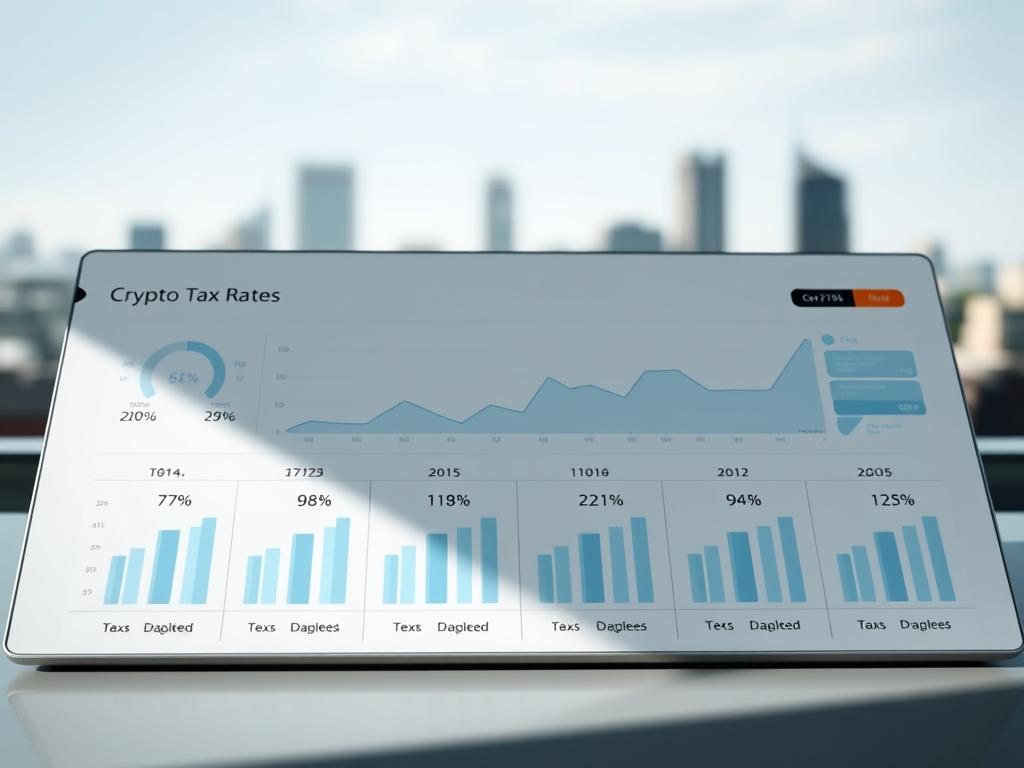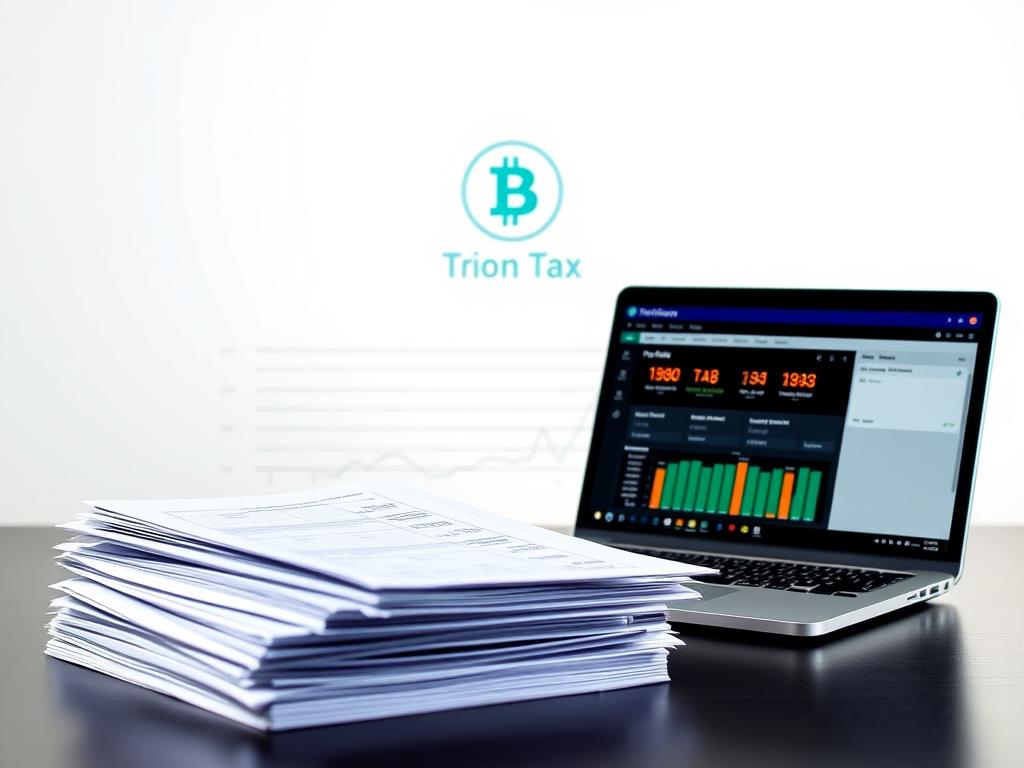The global cryptocurrency market is set to grow significantly by 2028. As digital assets gain popularity, grasping virtual currency tax rules becomes crucial. Investors must stay informed to navigate this complex landscape effectively.
The IRS treats cryptocurrencies like Bitcoin as property, not currency. This classification affects how crypto transactions are taxed. Every crypto transaction could potentially trigger a taxable event.
Crypto tax rules are becoming more sophisticated. The IRS has developed robust systems to track digital asset transactions. Staying informed about these regulations is vital to ensure compliance and avoid penalties.
Short-term capital gains tax rates can reach up to 37%. This applies to assets held for one year or less. Long-term investors might benefit from more favourable tax rates between 0% and 20%.
Being proactive about virtual currency tax obligations is essential. Upcoming changes in reporting requirements highlight the importance of comprehensive tax planning. Crypto enthusiasts should consider these factors when making financial decisions.
The Fundamentals of Cryptocurrency Taxation
Cryptocurrency taxation is complex. The IRS classifies digital assets differently from traditional currencies. Cryptocurrency tax guidelines have evolved, creating important frameworks for investors and traders.
The IRS classifies virtual currencies as property, not traditional currency. This classification has significant tax implications for crypto holders and traders.
IRS Perspective on Virtual Currency
Grasping IRS cryptocurrency guidelines is vital for managing digital assets responsibly. The government’s view of crypto assets affects tax reporting and financial obligations.
- Crypto is treated as property for tax purposes
- Each transaction potentially triggers a taxable event
- Capital gains and losses must be meticulously tracked
Property vs Currency: Critical Distinctions
Every crypto transaction could create a taxable scenario. Trading, selling, or using cryptocurrency for purchases might generate capital gains or losses.
Key Tax Implications for Crypto Holders
Investors must report crypto transactions on specific tax forms. This includes documenting the cost basis, sale price, and resulting gains or losses.
- Report transactions on Schedule D
- Use Form 8949 for detailed reporting
- Maintain comprehensive transaction records
Understanding these principles helps crypto investors navigate tax obligations effectively. It allows them to make more informed financial decisions.
What Tax is Paid on Cryptocurrency
Crypto taxation is complex. The IRS treats cryptocurrencies as property. Every transaction could trigger a capital gains tax event.
Tax implications vary based on trading activities and holding periods. Understanding these can help reduce tax liability and guide investment choices.

Capital Gains Tax Rates for Short-term Holdings
Short-term crypto tax applies to assets held under a year. These gains are taxed as ordinary income. Rates range from 10% to 37% based on your income bracket.
- Tax rates vary by filing status (Single, Married Filing Jointly, etc.)
- Income determines the specific tax percentage
- Highest short-term rate reaches 37% for high-income earners
Long-term Capital Gains Tax Considerations
Holding cryptocurrencies for over a year offers better tax rates. These rates are more favourable for investors.
- 0% tax rate for lower-income individuals
- 15% for most middle-income investors
- 20% for high-income earners
Income Tax on Mining and Staking Rewards
Crypto miners and staking earners face unique tax obligations. Mining tax treats rewards as ordinary income. This requires reporting at fair market value when received.
Self-employment tax implications may also apply. Keep detailed records of all crypto transactions for accurate reporting.
Pro tip: Keep detailed records of all cryptocurrency transactions to ensure accurate tax reporting.
Taxable Events in Cryptocurrency Transactions
Understanding crypto taxable events is crucial for investors. With about 2.5 million cryptocurrencies available, tax reporting has become increasingly important. Investors must be aware of their obligations.
Several key transactions trigger tax obligations in the cryptocurrency world. These include:
- Selling digital assets for fiat currency
- Exchanging one cryptocurrency for another
- Using crypto to purchase goods or services
- Receiving cryptocurrency as payment
- Mining or staking cryptocurrency
- Receiving airdrops or hard fork distributions
The Internal Revenue Service (IRS) views virtual currency as property. This means each transaction could create a taxable event. Understanding these events is crucial for accurate crypto tax reporting.
Different crypto transactions have varying tax implications. Here’s a breakdown:
| Transaction Type | Tax Treatment | Potential Tax Rate |
|---|---|---|
| Short-term Holdings (≤1 year) | Ordinary Income | Up to 37% |
| Long-term Holdings (>1 year) | Capital Gains | 0%, 15%, or 20% |
| Mining/Staking Rewards | Ordinary Income | Based on Tax Bracket |
Keeping track of every crypto transaction is vital. The market’s total value exceeds $2.41 trillion. This highlights the need for thorough tax documentation.
Knowledge of crypto taxable events transforms potential tax challenges into strategic financial opportunities.
Record Keeping and Reporting Requirements
![]()
Careful attention to detail is vital for managing crypto tax records. Nearly 40% of Americans own cryptocurrency, making reporting crucial for investors. The IRS is closely watching digital asset transactions, highlighting the need for thorough crypto transaction tracking.
Essential record-keeping involves documenting key transaction details. Investors must track the following:
- Date of purchase
- Date of sale
- Transaction amount
- US dollar value at transaction time
Precision in documentation can transform tax reporting from a daunting task to a strategic financial management opportunity. Different transactions require specific reporting forms, including:
| Transaction Type | Required Form |
|---|---|
| Capital Asset Sales | Form 8949 |
| Ordinary Digital Asset Income | Form 1040 (Schedule 1) |
| Digital Asset Gifts | Form 709 |
| Business-Related Transactions | Schedule C (Form 1040) |
Grasping tax implications is crucial for crypto investors. Short-term gains are taxed at ordinary income rates. Long-term gains enjoy reduced rates for assets held over a year.
Detailed records help investors turn compliance into a powerful tool. This approach offers financial insight and aids in strategic decision-making.
Conclusion
Crypto tax compliance is vital for responsible digital asset management. As the crypto world grows, understanding tax obligations becomes crucial for investors and traders. Proper tax planning helps you navigate this dynamic financial ecosystem.
Complex tax rules for digital assets require careful attention. Investors should keep accurate records and stay updated on changing regulations. It’s wise to consult tax experts who specialise in digital asset taxation.
Future crypto taxation will likely become more intricate. Government agencies are developing more detailed frameworks. Proactive learners who grasp these tax rules will be better prepared for their investments.
Successful crypto tax management needs ongoing learning and thorough documentation. It also requires adapting to changing regulations. By following these principles, investors can turn tax challenges into opportunities.
This approach fosters financial growth and responsible digital asset stewardship. It helps investors stay compliant while maximising their crypto investments.









